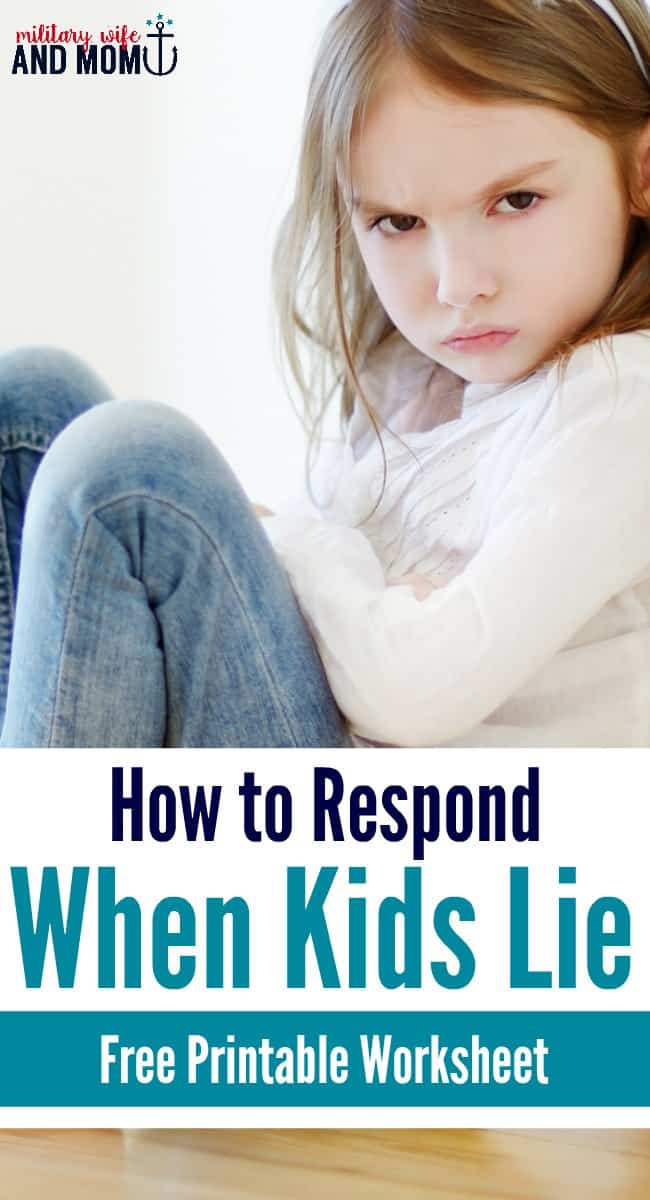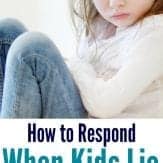Inside this post: Learn how to deal with a lying child. Help your child tell the truth while still keeping your boundaries and consequences.
It seems like my strong-willed child can never have enough snacks, but if you dare to put a meal in front of him, it’s a near 100 percent guarantee that he will not eat.
Last week I walked into the kitchen in time to witness my son scaling the pantry for yet another snack. I was particularly peeved because I just finished telling him, “Nothing more to eat until dinner time.”
And now it was clear that he was in the midst of chewing a cookie that he was not supposed to have.

Me: “What are you doing? You’re eating those cookies after I told you no more food.”
Him: {shakes head left and right while swallowing} “I didn’t eat the cookies.”
Me: “Now, you’re lying to me.”
Him: {pleading}. “I didn’t eat the cookies!!!”
This is a very tongue and cheek example (pun intended) of how lying, fibbing and truth stretching weaves it’s way into daily life. In the grand scheme of things, lying about cookies is small pickings.
But whether you are struggling with kids lying about cookies or kids lying about shop lifting or kids lying about school work, the approach for dealing with a lying child is much the same.
That’s the good news.
Why do kids lie?
There are three main reasons that kids lie…
- They think you don’t care. So they don’t bother you with the truth.
- They don’t think they can be honest with you without getting in trouble.
- And for the youngest of kids, sometimes the blend fiction with reality and tell a tall tale.
Most kids will make every attempt to meet their needs in an honest and authentic way. Lying begins when the child cannot meet their needs, and they feel there is no other way to solve the problem except through lying, fibs and truth stretching.
Here are a few examples…
1. A child may struggle to get good grades in school. They may try all different ways, but nothing seems to work and the parent only seems disappointed. So the child may start to lie about doing their homework, skipping school or paying attention in class.
2. Another child may want to eat a cookie, chocolate or biscuit and there doesn’t seem to be any alternative to eating what they want, when they want. So the child may start to eat treats and snacks when the parent isn’t looking and lie about it when confronted.
3. A child may hit another child when you aren’t looking. The first child tried to play peacefully, but he couldn’t seem to make it work. He starts hitting, but then covers it up. He doesn’t think he can share those frustrations without getting in trouble.
Related: How to Make Kids Listen: 30 Genius Resources for Parents
How to deal with a lying child.
The easiest way to stop a child from lying is to create a path to honesty. This usually starts with diving into the child’s world and seeing why they would lie in the first place. It might sound something like this…
“You thought I was going to say no.”
“You didn’t feel like you could tell me the truth.”
“You wanted to tell me the truth but you didn’t know how.”
These Helpful Phrases immediately shift the teachable moment away from accusatory statements like “I can’t believe you lied to me!” and “How dare you do that,” to open-minded communication and understanding.

A chance to problem solve.
Once the child feels understood and like “you get where they are coming from,” the problem-solving door is pushed wide-open. And you can say things like…
“Oh I see! Next time you are struggling with school, you can come to me and we will figure out a plan of action together.”
“I understand! You wish you could eat all the cookies in the world. You wish that is all there was to eat—only cookies! You can have a cookie after dinner.”
“That makes sense! You didn’t think you could get along without hitting. Next time you’re that angry, hit this chair over here. That way no one gets hurt. You can also call for help and I will come.”
Bring in the reinforcement.
Each time your child is honest with you, name those strengths. This is going to encourage and reinforce that being honest is a quality admired. It might sound something like this…
“You told me the truth even though you thought I would say no. That shows you’re honest.”
“You told me what really happened instead of covering it up. You know how to tell the truth!”
This is normal.
It’s completely normal and expected to have a child experiment with lying during different developmental ages and stages. In the same breath, kids yearn to feel close to their parents. They want to tell the truth so long as they can save face. Offering some alternative path to honesty can make all the difference.
Now when I catch my oldest eating treats he probably shouldn’t have, he announces, “I’m eating chocolate in my mouth!”
We work out the boundaries and consequences, but at least he’s honest enough to tell me when he’s sneaking chocolate. That’s wisdom even I could use.
Print this free toddler listening checklist.
This post comes with a free printable checklist to help with toddler listening. I always have the hardest time remembering these phrases. This printable simplifies it!
Here is a sneak preview…
Download Your Free Printable
- Download the checklist. You’ll get the printable, plus join 37,000+ parents who receive my weekly parenting tips and ideas!
- Print. Any paper will do the trick, but card stock
would be ideal.
- Place it on your refrigerator. Check things off as you go and don’t forget a thing!
Want more on parenting?
- 2 Year Old Not Listening? Try This Remarkable Phrase
- The Easiest Way to Deal With Hitting, Kicking and Biting
- 7 Foods to Support Better Behavior in Kids — According to Science
- The Tantrum Taming Tip Most Parents Don’t Know About
I've created a free email series just for you! If you are struggling with teaching your child to listen, this series will help transform your parenting. Yes, really. I've seen my proven strategies work time and time again for parents. I know it can work for you too.
After taking my free email series, you will:
- Learn simple, yet highly effective listening strategies
- Experience a stronger connection with your child
- Enjoy more peaceful parenting days
- Gain more cooperation from your child














Do you have information on hitting. We have twin grandchildren a boy and girl and our grandson is hitting a lot. Sometimes he just walks by her and hits her. He’s not always angry either
Yes I do! You can find that one here: https://themilitarywifeandmom.com/what-to-do-when-your-child-hits-you/
Lauren
What about if i have done exacly what was suggested. Caught the child telling a lie. After discussing why it was wrong and how it was no nice lie and better to tell the truth and have open communication and relationship because of trust and the child does it again. Then you have a discussion with them again and suggest they decided the consequences the should face for lying againg and then they do it again. Then what?